When I discovered that anti-Israel protesters had occupied one of the main buildings on my college campus early Monday morning, I had two very distinct reactions.
After they forced their way into UC Santa Barbara’s Girvetz Hall, intimidated maintenance staff into leaving, and barricaded themselves in, part of me immediately reacted as a journalist who saw an incredible news story and a chance to be one of the first ones to get it.
Another, very real part of me, reacted as a Jewish student, who has been deeply involved in my Jewish community at UCSB, and the events that have transpired since the massacre carried out by Hamas against Israel on October 7, 2023.
Over the past few days, as I witnessed a stunning series of events unfold on campus, these two, equally strong parts of me struggled for ascendancy.
Here is a report of what happened in real time:
Monday, 7:15 p.m. After hearing about what was happening, I drove to Girvetz Hall with a friend to take photos. I knew right away I wanted to document and write about this volatile event.
What I didn’t know at the time was that the anti-Israel extremists were still in the building.
When I walked around the back of Girvetz, to see if there had been more damage done, I saw something that seemed straight out of a war movie: a group of the masked extremists were reinforcing their barricades and patrolling the building like a tiny military battalion.

I felt my stomach drop, and my arm get yanked as my friend pulled me behind a wall. Both of our faces went blank as we tried to grapple with the scene we saw.
Monday, 7:30-8:50 p.m. We spent the next hour or so moving around the building, getting inside parts of it that were not blocked off, and listening to the occupiers through air vents.
We watched as the masked protesters rotated around the building, in what looked like well-organized shifts, taking turns on the roof with a megaphone chanting intimidatingly at the students below.
Monday, 8:55- 9:15 p.m. I was about to leave as my friend, Ephraim Shalunov, rounded the side of the building, and I ran to catch up with him.
We went to check out the encampment. As we approached, we were told, “Camp is closed!” and that we would need “someone inside to vouch for us” if we wanted to enter.
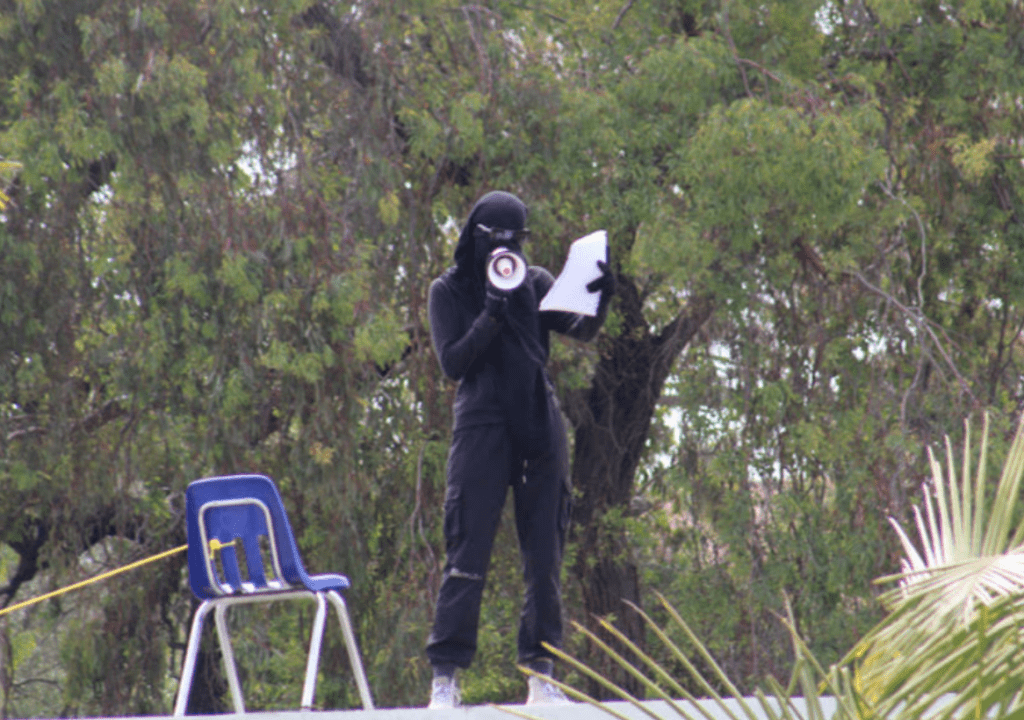
Regardless, we chose to enter the space and were immediately greeted by multiple cameras pushed in our faces and even more masked extremists calling us both out by name.
After a brief stroll and several unpleasant interactions, we circled back to the building and walked through one of the tunnels to get to the courtyard in the middle of Girvetz.
Monday, 9:15 p.m. Out of nowhere, green laser pointers shined on us. One was directed into Ephraim’s eyes, which is highly illegal according to California Penal Code. Just another addition to the multiple laws this group had already violated. Ephraim called the police.
Legalities aside, the emotions of feeling “tracked down” as a Jew were palpable.
As Ephraim put it, these “thugs operate with impunity on our campus. They attempted to burn my eyes with a green laser, threatened to throw people off buildings, and chanted in support of Hamas. Jews are not safe.”
Monday, 9:30 p.m. A few moments later, police officers met us on the side of the library and took our statements.
Tuesday, 12:15 p.m. The following afternoon, I returned to watch and wait for any changes to occur. I received a tip from another member of our community that the Regents had been in a meeting and planned to have a decision about how to proceed by 4 p.m., so I decided to wait.
Tuesday, 11 p.m. I received word via a big community group chat that police had been spotted on campus and lots of cars and vans were heading towards Girvetz Hall.
I went down one of the side tunnels and saw that one of the barricaded doors had been thrown open. It looked like the barricade had been dismantled from the inside out. I immediately had a feeling that the extremists had fled.
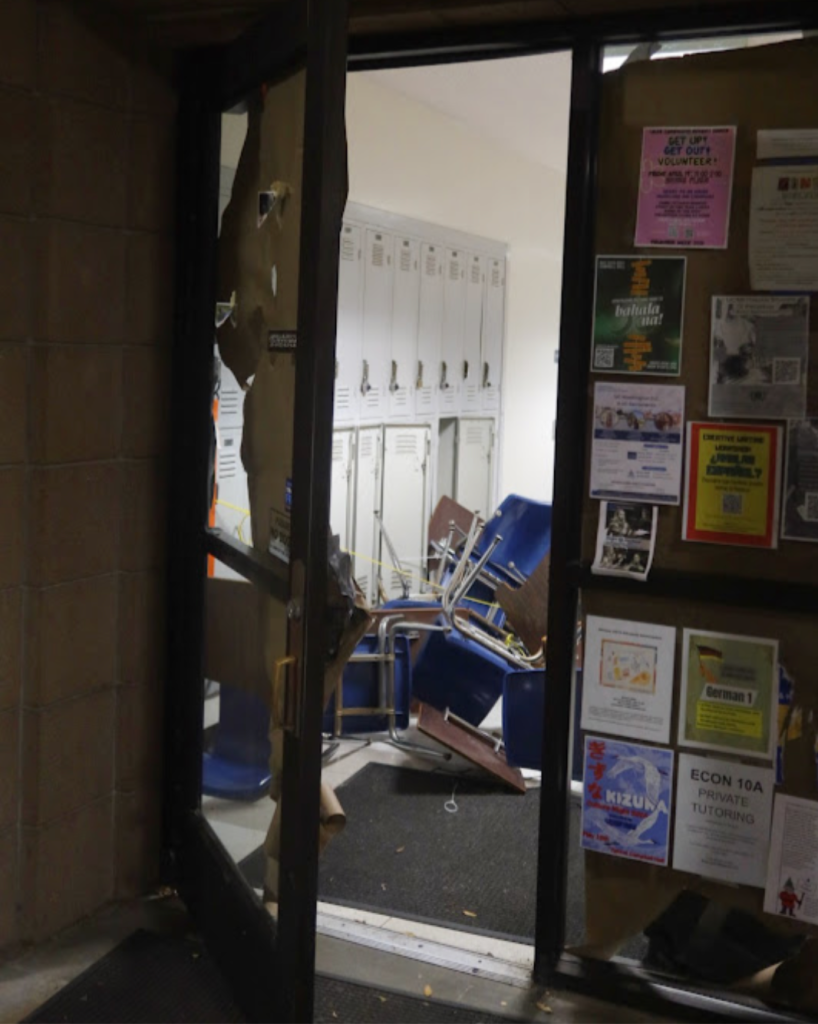
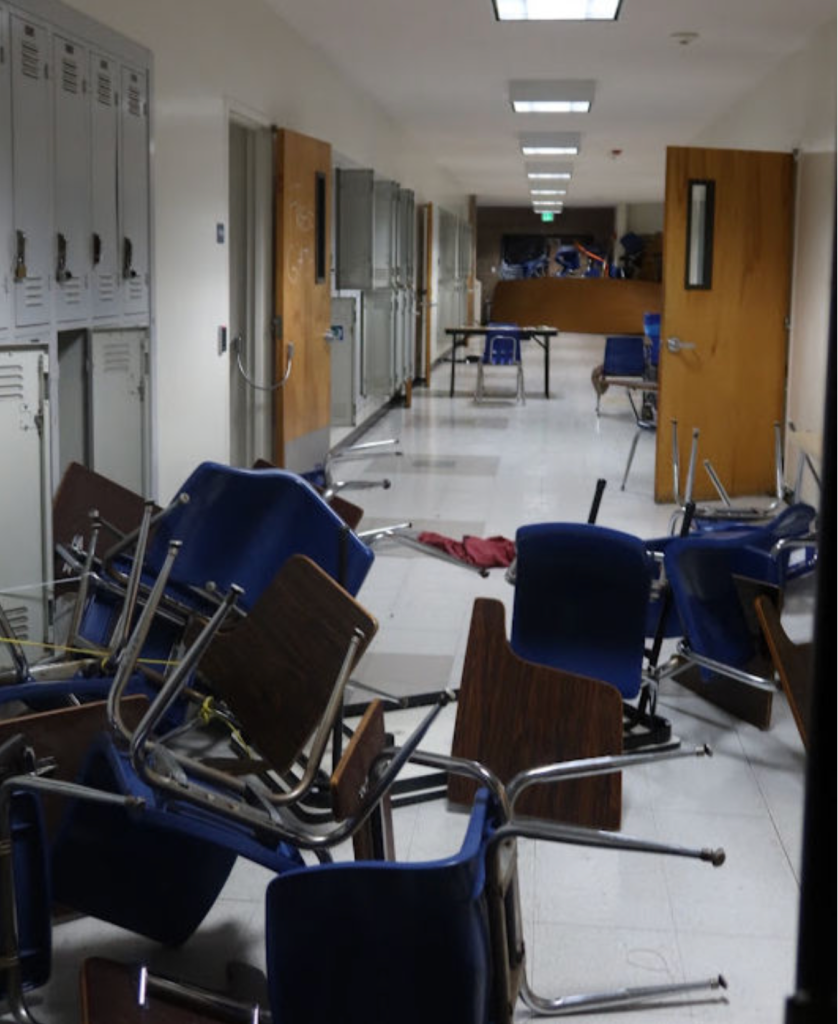
Wednesday, 12:15 a.m. In the next hour or so before police arrived, the encampment continued to get rowdier and the crowd continued to grow. Their anti-Semitic chants were painful to experience, as were their multiple attempts to antagonize my friends and me, continually shoving cameras in our faces.
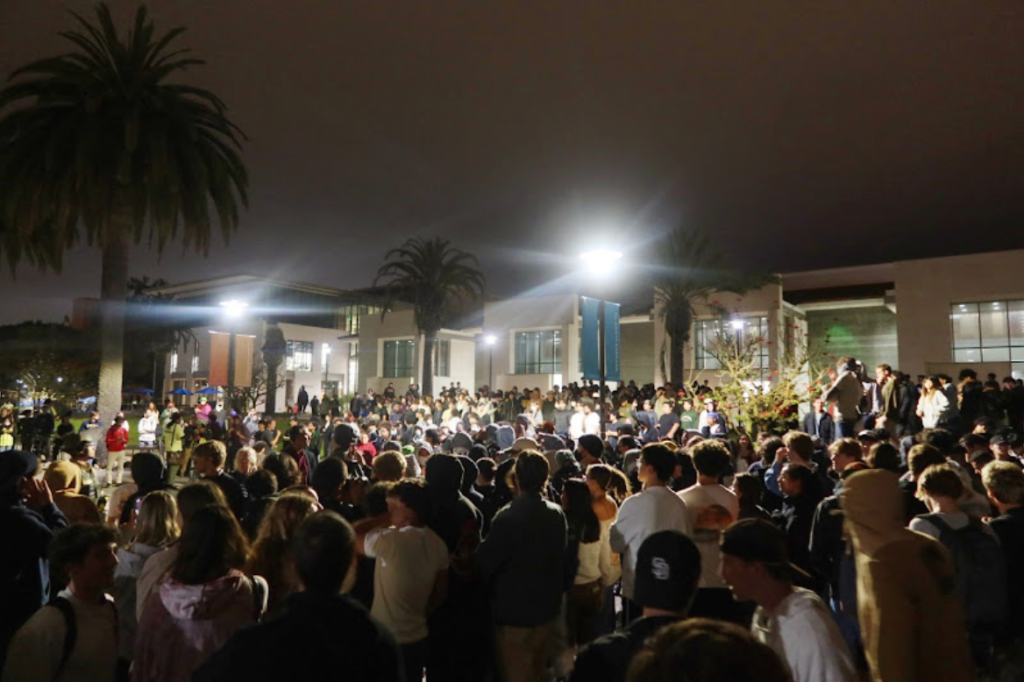
Wednesday, 1:06 a.m. Police cars and trucks poured from around the side of the building, and the crowd sprinted over to get a good view of the scene.
Wednesday, 1:45 a.m. Every time the police would move, the crowd would move with them, trying to watch the action. Police made their way into the building and began clearing rooms.
During this time, the encampment became the main hotspot and the crowd quickly shifted to focus their attention there, as they started a big drum circle, continuing their anti-Semitic chants.
“From the River to the Sea/Palestine will be free!” they chanted.
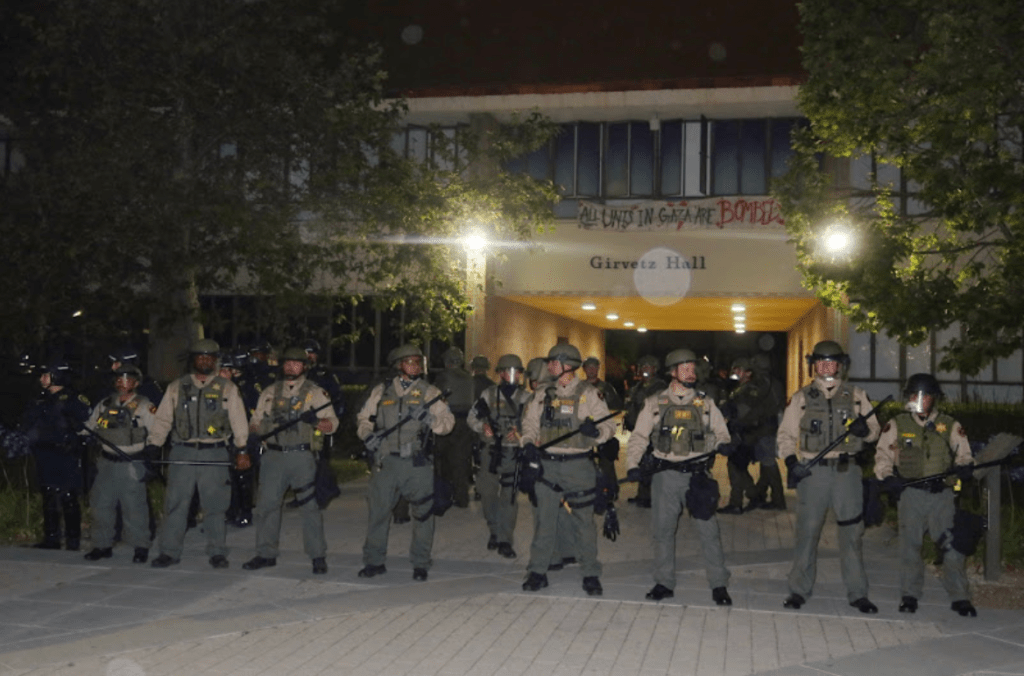
I stayed by the building, but my attention quickly got diverted to the encampment when I heard cries saying, “Zionists are raiding our camp, Zionists are raiding our camp!”
I grabbed hold of one of my friends’ hands as panic swept across both of our faces, imagining the worst. We both sprinted back to the encampment, shoving our way through the large crowd that had formed. As I pushed my way through, my brain couldn’t help but imagine the worst and pray I wasn’t about to see my friends bodies on the ground.
When I finally barged my way past the wall of students, I found my friends engaged in a heated debate with one of the administrators, surrounded by extremists yelling in their faces.
I pulled a friend aside to ask what happened, and he told me they were simply speaking with people inside the encampment when a group chased them out.
Once again, a disturbing display of anti-Semitism and how quickly propaganda can spread through a crowd.
My friend Ephraim stated that “a senior university administrator asked me to leave, because my very presence as a living, breathing, proud Jew was, in their word, ˜inflammatory.”
Not one of the masked aggressors was impeded in any way.
Wednesday, 3 a.m. I returned to my friend’s house to try to piece my story together and get some sleep.
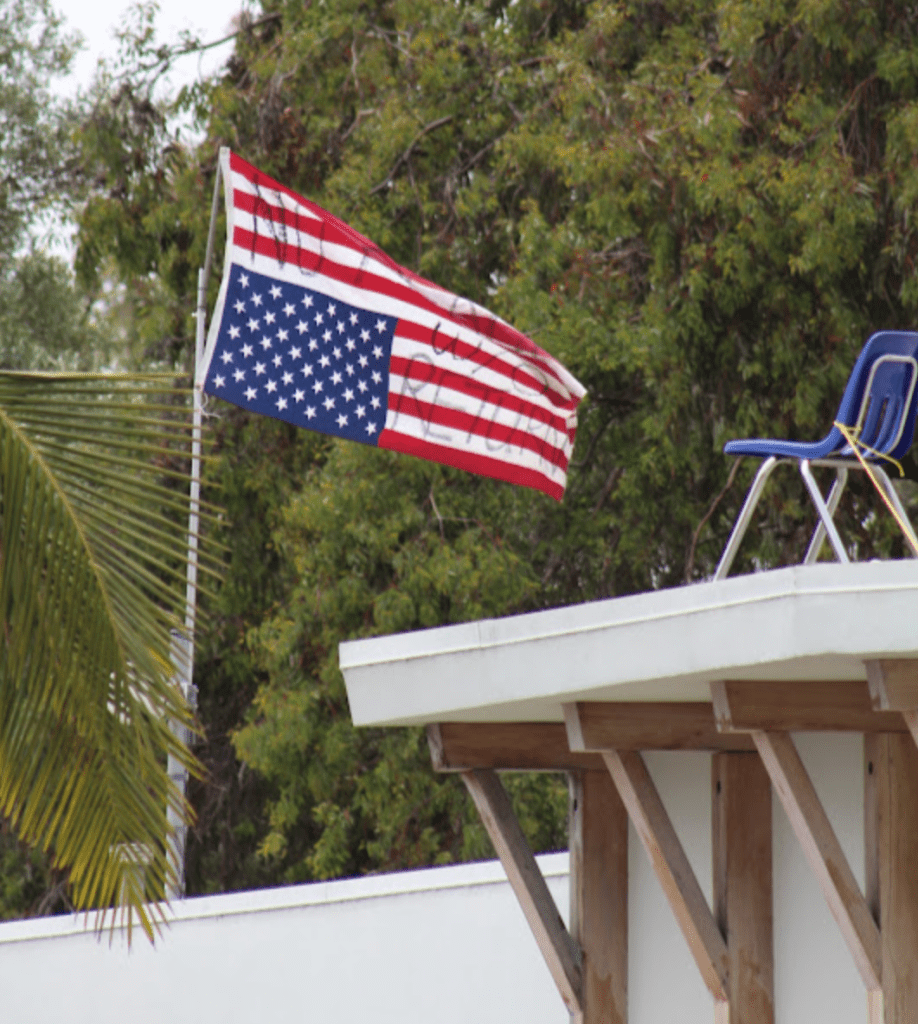
Wednesday afternoon. At some point during the day, other sources confirmed the occupiers had in fact fled the building prior to police arriving.
This seemed laughable, considering their one consistent statement was that they would only exit the building willingly if the school released a statement saying the situation is a genocide.
In other words, they specifically did the one thing they swore not to because the situation got a little too real for them to handle.
As for our Jewish community, we are more connected and stronger than ever following the events of the past few days. We will continue to stand tall and united.
We always do against rising anti-Semitism in a place that should feel safe to everyone.
Lily Karofsky is a Jewish-American student who majored in journalism at SBCC before transferring to UCSB, where she is studying Communications. A member of UCSB Hillel, she works actively to bring awareness to rising anti-Semitism on college campuses.


You must be logged in to post a comment.